Six years of Putin’s rule in Russia: victory and crisis
The Paper news, who is Putin?
Former US President Bill Clinton once described him as a cold-hearted and trouble-making person.
Obama once described his "listless" behavior as "a boring child sitting at the back of the classroom";
Former US Secretary of State Hillary Clinton and he failed to have a "chemical reaction" and once ridiculed him as a "sensitive tough guy".
……
But until today, there is still a huge gap in the outside world’s cognition of Putin.
Even the most authoritative experts on Russian issues still have many unclear points about Putin’s career path and key time nodes in his resume. In the global media, Putin’s masculine image seems to be everywhere, but little is known about his personal habits and logic, even his close "allies". In 2014, Crimea was merged into Russia, and Putin’s unexpected lightning action once again caused many politicians and observers in the western world to fall into collective reflection-what was overlooked in the past understanding of the leader’s behavior?
On March 18th, when the new presidential election in Russia started, it may be helpful to understand where Putin will lead Russia in the next six years by sorting out and re-evaluating the detailed process of Putin’s response to two major crises during his six years in power, and the decision-making characteristics, belief ambitions, political wisdom, personality characteristics, and hidden crises and limitations behind it.
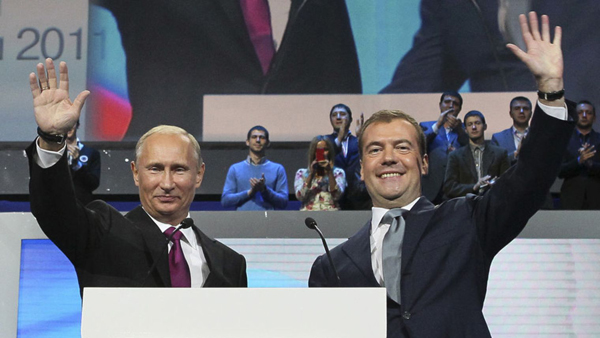
On September 24th, 2011, then Russian President Dmitry Medvedev announced at the United Russia Party Congress that he proposed that then Prime Minister Vladimir Putin should participate in the 2012 presidential election.
The "recovery strategy" failed.
September 24th, 2011, Luzhniki Gymnasium, Moscow.
A tidal wave of cheers echoed over the stadium.
On the huge screen on the stage, Putin’s close-up quickly replaced the then President Medvedev. Putin, who was under 59 years old, sat in the crowd and enjoyed this "victory" moment.
"I want to say directly: we have reached an agreement on what we will do in the future, which was reached several years ago." Putin tried to smash all kinds of speculations in one sentence.
At that time, rumors about the "Mapp dispute" have been going on for several months. Is Medvedev re-elected, or is former President and then Prime Minister Putin back to the peak of power? The final answer was finally revealed. More than 11,000 party member people gathered in Moscow to witness the release of this "heavy message". This is the largest congress of the Russian ruling party "United Russia Party" in history.
But three months later, two large-scale public demonstrations broke out in Russia, which directly posed a test and impact on Putin.
Andrew Kuchins, a well-known American expert on Russian issues and director of the Russia and Eurasia Program of the Center for Strategic and International Studies (CSIS), wrote earlier that during private discussions with Putin and his inner circle, Putin was caught off guard, and "the demonstration was a big shock to Putin personally".
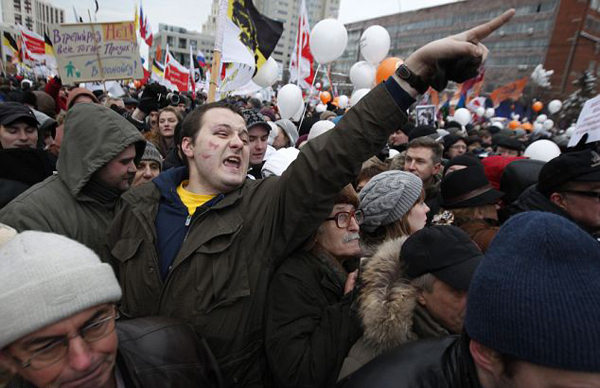
On December 24, 2011, in Moscow, tens of thousands of people protested Putin’s third presidential election.
This is the largest protest in Russia since Putin took office. The mass rally on December 24th was directed at Putin himself and his upcoming 2012 general election. Demonstrators lashed out at the stable structure of Putin’s re-election team, which directly led to the lack of mobility of Russian political elites and weakened the breadth of political participation.
"As far as Putin’s personality is concerned, I doubt that the protests in 2011-2012 will scare him or change his (ruling) plan." Professor Shestopal, an expert in political psychology in the Department of Political Science of Moscow University, recently told The Paper (www.thepaper.cn) that she had conducted a systematic study on the cognitive transformation of Putin in Russian society from 2000 to 2016. "He (Putin) is the kind of person with a strong sense of mission".
"Protests only give him more reason to run for office," Denis Volkov, a sociologist at the Levada Center, an independent Russian polling agency, also told The Paper.
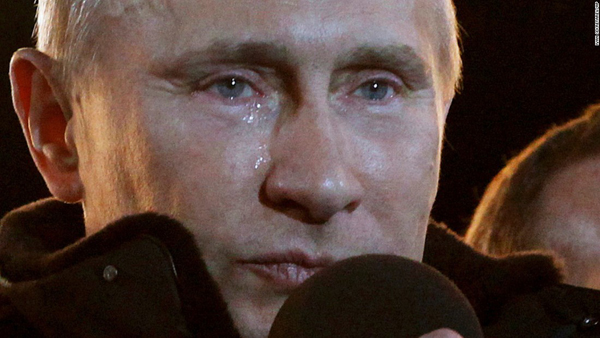
On March 4, 2012, Putin announced that he won the sixth presidential election in Russia and would begin his third presidential term. When he met his supporters in Manesh Square in Moscow, he was emotional and even shed tears.
However, the image of "tough guy" that Putin and his team have been carefully creating for him is obviously facing new challenges. According to the data of Levada Center, an independent Russian polling agency, Putin’s support rate dropped to a low level in 2010, 2011 and 2012.
Before the 2012 general election, even during Medvedev’s administration, Putin’s "sense of existence" was always indispensable: in 2008, the news that he went deep into the virgin forest of the Far East to anesthetize a Siberian tiger made the global media report; In 2009, during his vacation in the Republic of Tuva, the photos of him riding bareback were even more popular around the world. In 2010, Putin personally piloted the Be-200 waterway amphibious plane to fight the fire on the outskirts of Moscow, and the photos were also numerous.
"These super masculine characteristics seem to support the domestic power base and legitimacy of the (Russian) president." Elizabeth Wood, author of The Roots of the Russian-Ukrainian War (2016) and director of the Russian program at the Massachusetts Institute of Technology, wrote.
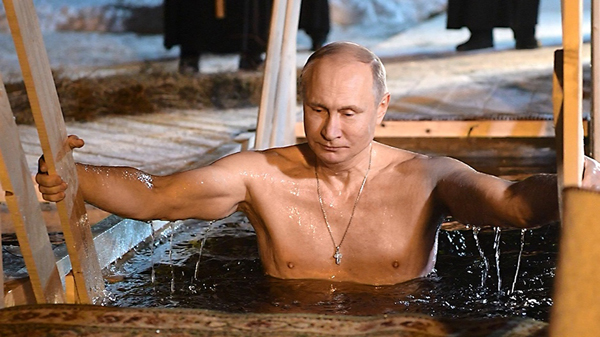
Putin’s "tough guy" image continued until the 2018 general election. The picture shows that on January 19, 2018, the Russian Orthodox Church Baptism Festival, Putin was baptized in the ice water of Lake Sheriger.
Putin, who suddenly became acting president of Russia at the turn of the century on December 31, 1999, still has many uncertainties about his career path and specific time sequence. Even there are many conflicting versions about how he was chosen as the successor of former Russian President Yeltsin. Putin officially took office as Russian president in March 2000, which opened the Russian era under his rule.
In the presidential campaign in 2012, Putin still often talked openly about the turbulent years in Russia during Yeltsin’s presidency in the 1990s, which was in sharp contrast to the political and economic stability in Russia in the ten years since he became president in 1999. This "recovery strategy" (which led Russia out of the "chaotic years" of the 1990s-editor’s note) achieved excellent results during Putin’s first and second presidential terms, and also won him a high support rate.
According to Bo Petersson, an expert on Russian issues and a professor of political science at Malmo University in Sweden, this strategy has become outdated. He believes that Putin focused more on the past than the future at that time, "at one time, he gave people a very weak look," he told The Paper a few days ago.
"Recovery (strategy) has not given way to a more far-sighted modernization model," Richard Sakwa Sakwa, a professor at the School of Political Science and International Relations of the University of Kent in the United Kingdom and an internationally renowned expert on Russian issues, has a similar view in an article evaluating Putin’s third presidential term.
Peterson said that the inspiration Putin and his team got from the large-scale protests in 2011-2012 was that "he (Putin) can’t afford to look weak or hesitant".
During the first two terms, Russia’s economic growth reached about 7%, and even after the global financial crisis broke out in 2008-2009, Russia’s economic growth rate remained over 4%(2010-2011). However, when Putin decided to return to the presidency in 2012, despite the high oil price, the signs of Russian economy stagnation were still clearly visible.
Even as a leader who created Russia’s prosperity for ten years and returned to the presidency in 2012, Putin had to re-examine and face the new situation of this country.
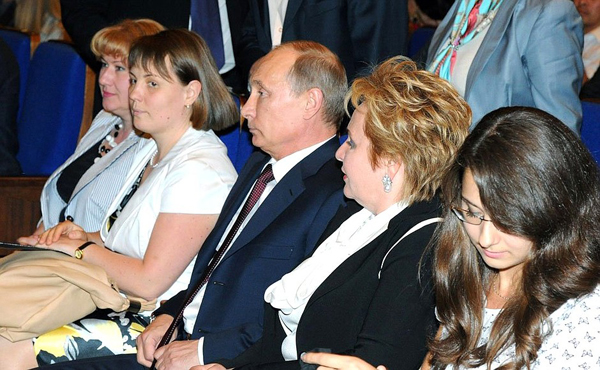
As an evergreen tree in politics, Putin’s personal life is rarely known to the outside world. On the evening of June 6, 2013, Putin and his ex-wife lyudmila watched a ballet performance in the Kremlin, which was the first time that they made public appearances together for more than a year. After the performance, the two announced that they had divorced.
"He is certainly conservative, but not extreme."
The most straightforward challenge comes from the people who participated in the protests.
"For the first time in a decade, the protest surpassed the marginalized opposition groups, and young people and the urban middle class formed a vital part. They had no interest in politics before." Vladimir Petukhov, director of the Center for Comprehensive Social Studies of the Institute of Sociology of the Russian Academy of Sciences, and Leontiy Byzov, a senior researcher and sociologist at the Center, recently told The Paper that this has sounded the alarm especially for the Russian rulers.
"Cracks are beginning to appear on the wall", and german, a professor of political science and sociology at EUSP in St Petersburg, made a more vivid metaphor.
At that time, some related studies and surveys also showed that most of these participants were relatively wealthy middle class, even upper class, who had benefited greatly from Putin’s ten years in power. Despite their different demands, this is a group of urban people who have received higher education and have professional confidence.
In addition, the past decade has coincided with the unprecedented development and spread of social media technology in Russia. After the scandal broke out in the Russian parliamentary election in December 2011, young urban professionals turned the demonstration initiative initiated on social media into a protest that spread across the streets of major cities across the country.
Sakova, an expert on Russian issues at the University of Kent in the United Kingdom, called this group "the creative class" (the "middle class" in the mouth of Russian commentators). After the unprecedented growth in economic strength and living standards, these people expect the country to achieve better governance and policy innovation.
Sakova summed up the main demands of this group as: eliminating corruption and bureaucracy and realizing new economic growth points.
Keen Russian political observers found that in the months immediately after the 2012 presidential election, the re-elected "new president" seemed to have obvious fatigue, "lacking foresight and needing new ways to exert his previous magic to the public". Peterson, a professor of political science at Malmo University, commented on the state of Russian leaders at that time in an article devoted to Putin’s charisma and legitimacy in 2017.
Peterson told The Paper, "The feeling of great power and its self-confident behavior seem to have a very high degree of support in the constituency. Putin and his team have been carefully practicing this role, which is obviously a response to the decline in support rate in the 2011-2012 (demonstration) incident. "
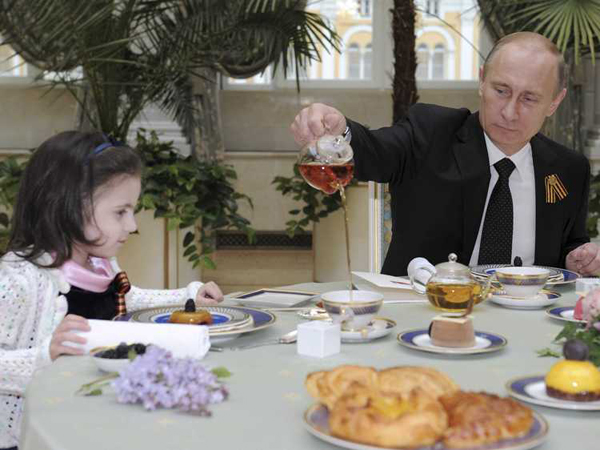
On May 9, 2012, two days after taking office for the third time, Putin poured tea for Sonia, an 8-year-old girl visiting the Russian Children’s Oncology, Hematology and Immunology Research Center, at the Kremlin in Moscow.
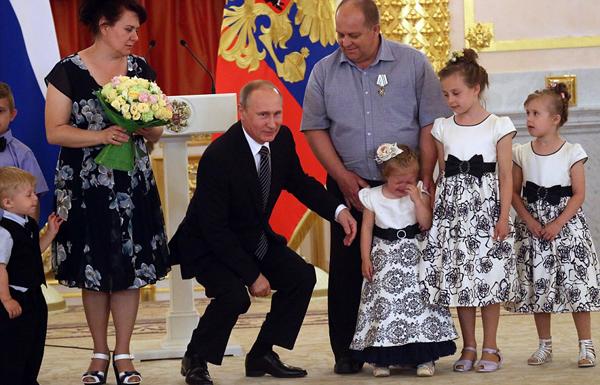
Putin is sometimes "helpless" in front of children. On June 4, 2016, Putin attended the Children’s Day celebration, but the little girl who won Putin’s award kept crying on the stage. Putin tried to comfort but it didn’t help.
In 2013, at the annual meeting of Valdai Discussion Club, a Russian think tank, Putin performed even more incisively and vividly. "We should stop staring at the bad things in our history and sell ourselves short, even our opponents will not condemn us like this," Putin said at the time. "We must be proud of our history."
Since its establishment in 2004, "Valdai" Club has become famous overseas for Putin’s personal "platform" and face-to-face dialogue with scholars around the world. Although Russia has a strong official color, it has gradually become one of the important platforms for Russian leaders to show their internationality. Every year at the annual meeting, prestigious scholars and experts from all over the world gather together to gain insight into Russia’s new strategic trends.
On this occasion, the emphasis on Russia’s glorious national history and traditional values reflects the adjustment of Putin’s strategy in the eyes of most Russian political researchers.
Olga Kristanovaskaya, a female sociologist who has been studying Russian political elites for a long time, had an in-depth observation on this strategy in an interview in 2014. She believes that Putin’s deep-rooted plot of the Russian empire has won the support of most Russian political elites, who are more conservative than Putin and have the appeal of taking a tougher attitude toward the West.
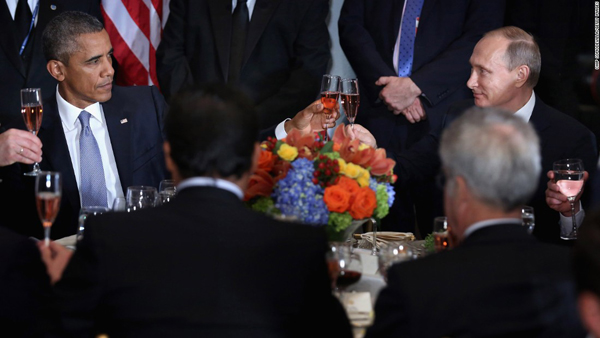
On September 28th, 2015, Putin and Obama clinked glasses at a luncheon hosted by then UN Secretary-General Ban Ki-moon.
"Until recently (2014), Russian political elites have been critical of Putin. Although not known to the public, this criticism requires (him) to take a tougher stance toward the West. " Kristanovaskaya also said in the interview that she was a member of the Russian State Duma and was regarded as one of the most authoritative experts who had in-depth research on the Russian elite.
Jeffrey Mankoff, deputy director of the Russian and Eurasian Program of the Center for International Strategic Studies (CSIS) in the United States, believes that Putin began to push traditional values, targeting another group of people, "not the urban (middle class) class, but people in inland cities, post-industrial cities or rural areas".
Volkov, a Russian sociologist, also agrees that the policy adjustment after the beginning of Putin’s third term is generally not conducive to the middle class, because they are more interested in integration with the West. "They think that doing business needs more competition and protection, I mean in property rights" and "they don’t benefit much from the policy (adjustment)".
"If we observe the actions (taken by the Putin government) and the decisions adopted, since the demonstrations, (policy) has changed." Mankov told The Paper recently.
Shestopal, a professor in the Department of Political Science of Moscow University, holds the opposite attitude. She believes that the demonstrations in 2011-2012 did not affect Putin’s decision on his third term.
"Putin is a man who believes in strong government and traditional values, but he is not a nationalist." She told The Paper, "He is certainly conservative, but not extreme. This will be difficult to change in the future. "
In the book "Putin Biography: An irreplaceable Russian Tough Guy" reprinted in 2015, Fiona Hill, the current special assistant to President Trump of the United States, the senior director of European and Russian affairs of the National Security Council, and Clifford G.Gaddy, a senior researcher at the Brookings Institution, described their efforts to deeply understand the world outlook of Russian leaders:
"Putin’s concept is shaped by multiple influences: the historical background of the Soviet Union and Russia, in which he grew up, worked and lived; Personal interest in Russian history and literature; He studied law at Leningrad State University (now St. Petersburg University); His training in the KGB; His experience in the KGB branch in Dresden, East Germany; Experience in St. Petersburg in the 1990s; The early experience of arriving in Moscow from 1996 to 1999. "
According to her research, Kristanovaskaya, a former member of the Russian State Duma, puts forward that Putin’s belief has two sources: one is the experience of the KGB; The second is the love of East Asian Wushu, which is not limited to action skills, but also includes some philosophical thinking and lifestyle.
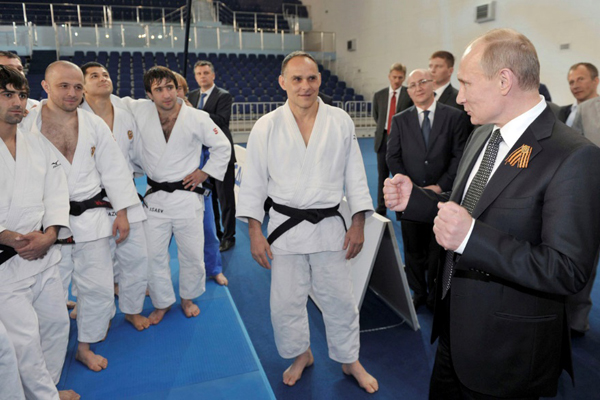
Judo is Putin’s favorite sport. On May 8, 2012, in Zvinigorod, Russia, Putin expressed condolences to judo players, and made judo moves with his hands clenched in exchange, hoping to compete with the players.
But volkov, a sociologist at the Levada Center, believes that "we know nothing about Putin’s personal habits." He said that Putin’s image is more the product of TV media, "a very tough and healthy man."
In order to cope with the new changes in Russian society and groups, Medvedev announced a series of reform measures before the end of his presidency, such as direct election of local governors and simplification of registration procedures for political parties. In the early days of Putin’s third presidency, these reform measures were introduced more or less, including that opposition leader Alexei Nabal was allowed to participate in the election of Moscow mayor in September 2013, and won an unprecedented 27% of the votes.
But soon, "I think there was a turning point towards conservatism." German, a professor of politics and sociology at EUSP in St Petersburg, told The Paper that Putin’s priorities in the initial stage of his third term had changed greatly compared with his first and second presidential terms.
Sakova, a famous British expert on Russia, wrote, "Before Putin’s third term, the hymn of the Medvedev era was abandoned."
"Since 2012, the agenda of Russia’s socio-economic modernization (put forward at the turn of the century and advocated during Medvedev’s presidency) is no longer among Putin’s priority policy items, or at most it is listed as the second echelon." German said.
Petuhoff, a sociologist at the Russian Academy of Sciences, believes that the path of building socialism and liberal views, including reconciliation with the West, has been tried and produced negative results, and this path of relying on traditional values and "soft nationalism" has become a natural result. "It is necessary to unite society around something." He told reporters.
"In recent years, it is obvious that the trend of neo-liberal globalization led by elites has led to the deterioration of the material and spiritual life of most residents in Russia," explained Levashev, a sociologist who specializes in the stability and transformation of Russian society. "The lead of national political consciousness has begun to play a role between society and the country."
Original title: Special feature | Six years of Putin’s rule in Russia: victory and crisis (I)